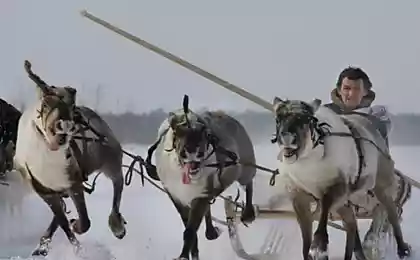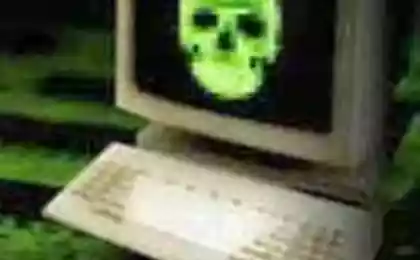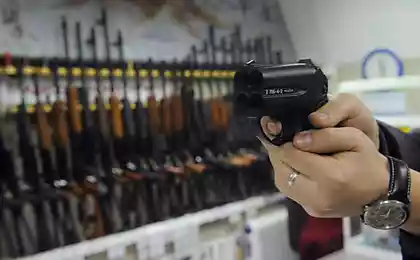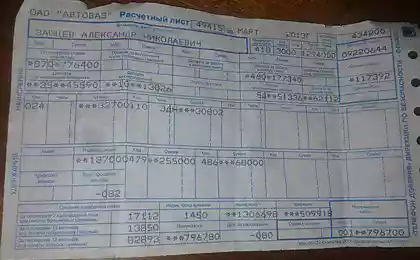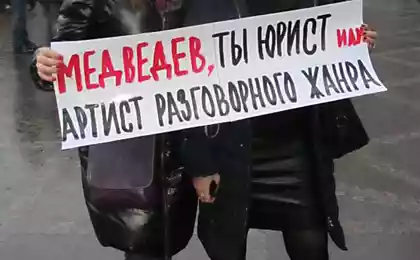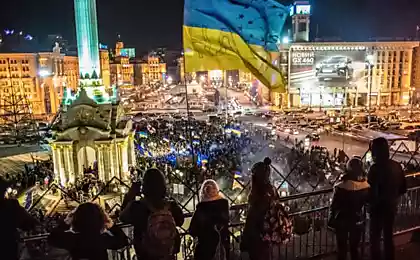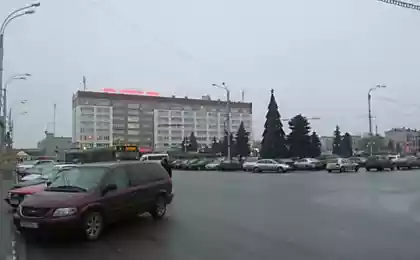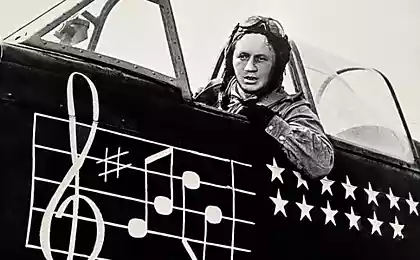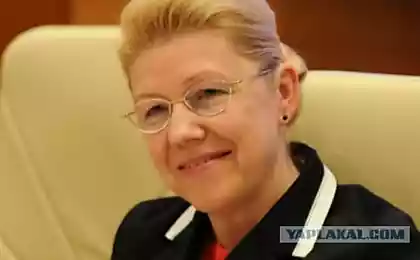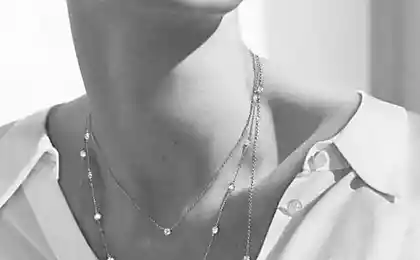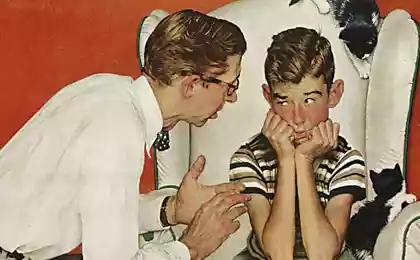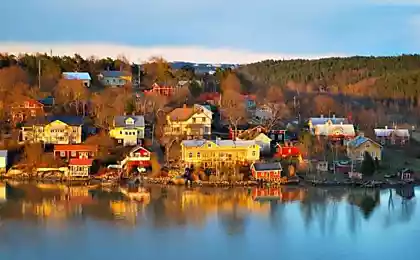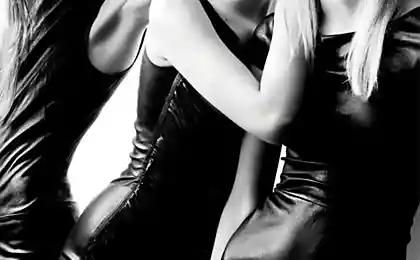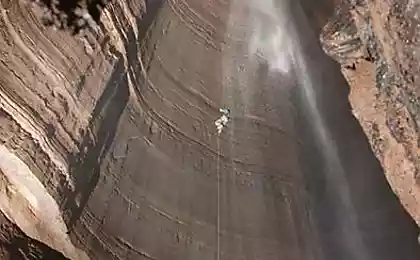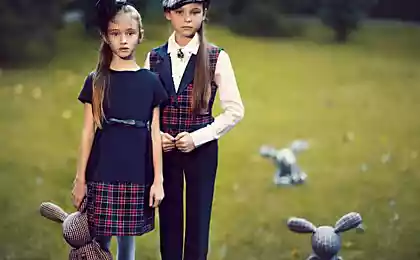627
Nationalists take the State Duma!
According to the forecast of the Public Chamber, it will happen in 2016
As early as the next parliamentary elections in Russia will nationalist parties, who will be able to dial up to 10% of the vote. This conclusion makes the working group of the Public Chamber (OP) for the analysis and resolution of international conflicts in a study commissioned by the close to the "United Russia" the Institute for Public Planning (INOP). The final results will be presented in the report "The National Question in public and political life", which is manifest in the end of May. But some of the theses became known now - they announced the head of the working group of Mikhail Romanov.
7 photo
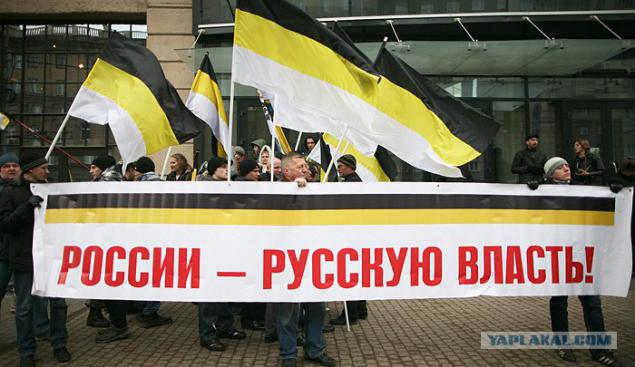
Short abstracts are as follows:
- While the nationalist parties in Russia are not strong enough, however, in 2016 when the parliamentary elections will be held, the situation will change.
- After four years without any problems, they will be a barrier to 5%, and in the best party with patriotic rhetoric will be able to dial up to 10% of the vote.
These findings indirectly confirms the analysis and "Levada Center." In November 2012, the center conducted a survey of analysts in the capital and made a rating of parties. Nonexistent party "nationalist" was in second place after the "United Russia", ahead of the Communists, the Liberal Democratic Party and "Yabloko».
It is appropriate to recall the history of the success of the Ukrainian nationalist party "Svoboda". In the parliamentary elections in November 2012, attended by 87 parties, "Freedom" was among the five parties that entered the Parliament - and, with the result is 10%. It is symptomatic that the party enjoys support even in the Donetsk region, whose population is traditionally negative attitude to the ideology of Ukrainian nationalism. Cells "Freedom" are available in regional centers and small towns - despite the fact that the financial resources of the Party, the competition is quite modest.
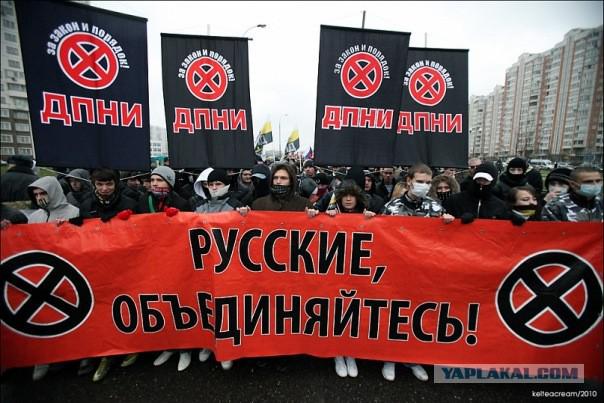
Will succeed Russian nationalists?
- The proportion of people in Russia, supporting the nationalist ideology - 10% of voters - unchanged for 12 years now, and it does not grow, - says the leader of the "new power", Professor Valery Solovey. - There are two important factors that determine the behavior of the electorate. First, we must realize that no party in Russia, which calls itself a nationalist, the Kremlin will not be registered. Secondly - we already have a registered party that this electorate can claim: the Liberal Democratic Party and the party "Rodina". So the next Duma elections - as it was before - the nationalist electorate rastaschat by different parties. In Russia, unfortunately, there is no political force that would be able to consolidate it and lead.
- What if OP picks your research?
- It is an element of fear trade. Like, here, look - the nationalists will go to the parliament. What the Liberal Democratic Party in the Parliament we have not presented ?! I have these fears are ridiculous ...
- Why is not growing number of supporters of nationalism? - People here are afraid of open association with nationalism. The paradox is that while the vast majority of our population supports the position of banal nationalism. They understand the importance of ethnicity, two-thirds of people experiencing xenophobic feelings towards certain ethnic groups. In other words, the breeding ground for nationalism in Russia there.
In my opinion, the problem of Russian nationalists is that there were a party that implements a nationalist agenda, but it does not call himself a nationalist.
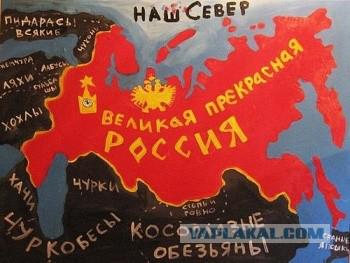
- Is there a chance that "masked" party with a nationalist agenda will be by 2016?
- From a purely nationalist agenda to sense a little, the agenda should be broad - social and political, nationalist elements should only be included in the package. With regard to timing - the present Duma fails to finalize until 2016, it is now becoming apparent. I think the disposition of political forces in the event of early re-election of the Parliament will be unpredictable. It is to this development the Kremlin is preparing today.
- Chaos of early elections to the Duma gives you a chance to strengthen the position of the nationalists?
- Not sure. Early elections are an attempt to get out of a serious national crisis, but they only exacerbate the crisis. And what will happen in the chaos, it is impossible to predict. It is impossible to say who is in this situation will prevail.
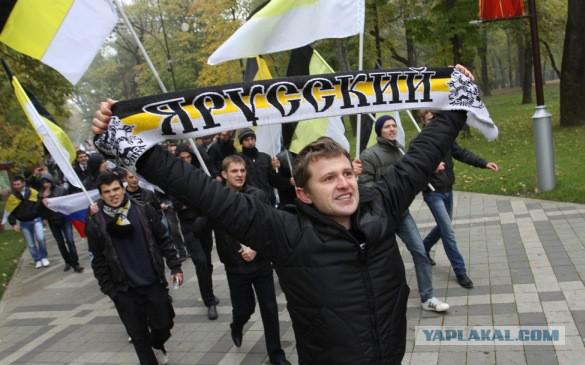
- Russian nationalism can develop on the Ukrainian scenario?
- No, we have with Ukraine, the political situation is completely different. Ukraine was formed as a nation state. The Russian authorities are trying to revive our country's territory, chimerical Eurasian empire in which there is no place to nationalism. From the point of view of the Kremlin, Russia - not the nation-state. Such power will prevent anything that is connected not only with nationalism, but also with the realization of national interests.
The chances for the nationalists in Russia is - and, in my opinion, very good. But again, only if they stop calling themselves nationalists and change agenda ...
"National Party - I would not call them nationalist - have a very good electoral chances," - said a member of the Coordinating Council and opposition from nationalists Konstantin Krylov.
- In view of the specific situation in the country, the national question today is very acute in Russia, - says Krylov. - Moreover, the government itself tried to strengthen the sector nationalists. So the emergence of national parties is possible. Just to say: we are talking about political parties, which can not cause fear and terror in the man in the street. It will be legal parties, which will deal exclusively with the political struggle for the rights of Russian.
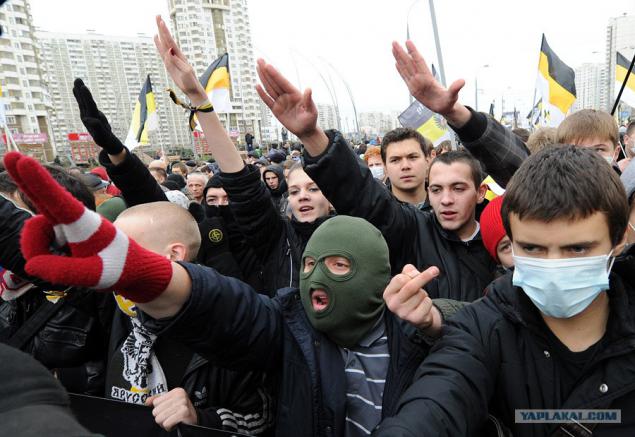
- Is the Kremlin is interested in the appearance of these parties?
- The Kremlin is, maybe people are bad, but think they are quite clear. They understand that the policy which they are - and the other, for various reasons, they can not spend - nationalists are simply doomed to success. Excuse me, but what the Kremlin expected once created, for example, the institution of privileged people - Caucasian - in Russia? Or after multiplied the number of migrants ?! Not surprisingly, the public mood appeared National Bank.
The Kremlin is now thinking, what if the situation will not be possible to reverse the (repressive plan "A" also worked out). Then the government will have to begin to plan "B" and analyze the processes that the Kremlin considered harmful. Publication of the study of the Public Chamber in May will be a signal, an invitation to the elite discussion to plan "B". This plan involves, in my view, that the nationalists will be able to take a large number of votes in the election, and the Kremlin is forced to think in advance about the legal forms of use nationalist ideas. One of moves - use the national rhetoric as part of pro-Kremlin parties. But there are other moves that the elite will discuss ...
"The Nationalists will fall to Parliament only if the Kremlin will weaken," - said vice-president of the Center for Political Technologies, Alexei Makarkin.
- I believe that the Duma early elections will not be because the Public Chamber in his study and talks about the year 2016 - said Makarkin. - To dissolve the parliament, the President must either dismiss the government, that this Parliament will make a vote of no confidence, or should be a situation in which the Duma rejects three times the three candidates proposed by the President at the premiere. All this is now unlikely scenario.
As for the participation in the upcoming Duma elections nationalists think OP realistic about their potential. In these evaluations, experts largely repelled from the analysis of the party "Rodina". Let me remind you, in 2003, a moderate nationalist "Motherland" Dmitry Rogozin and Sergei Glazyev received 9% of the vote and passed in the State Duma.
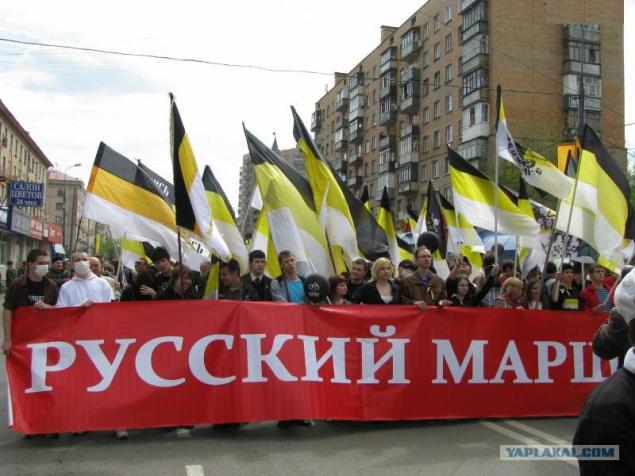
Today, a request for a party that would have expressed the national idea, combined with the idea of social justice, did not disappear. "Homeland" of the 2003, by the way, this was. For example, she preached the idea of weaning revenues from the oligarchs and transfer them to the people through the distribution of natural resource rents.
But do not forget that the project "Homeland" was created in the Kremlin. Power itself has put his helm specific politicians - who otherwise might not get up - and provided the party "green light", including in the media. Only this nationalists gained the elections-2003 good result.
Today the situation is completely different. First of all, the nationalists split because of internal disagreements and conflicts. Conflicts like these are ideological in nature - for example, discusses the degree of radicalism organizations, or attitude towards the Orthodox Church - and leadership. It is hard to imagine, for example, that "the Russian National Union," Sergei Baburin find a common language with one of the leaders of the nationalist movement "Russian" Dmitry Demushkina.
Yes, and the Kremlin's position in relation to the nationalists twofold. On the one hand, there is a formal admission into the political space nationalist parties among the preexisting. However, these projects too much, they are too few and scattered to become successful alone.
In principle, the Kremlin can, if necessary, to take some of those projects under its aegis, and to provide them with the necessary resources. This will allow him to gain a significant nationalist faction in the parliament, which will be required to support the current government. On the other hand, before the eyes of the Kremlin have experience the same "homeland" - perhaps the party was in the State Duma, then in a very short time has become play their own game. How it ended, all well know - "Motherland" collapsed, and its elements are included in a totally different project called "Fair Russia". Again forming a nationalist movement that later would be uncontrollable, the Kremlin does not want to.
And among the nationalists themselves are divided as to the true power. National Democrats are in opposition to the Kremlin, while the "Russian People's Union" is cooperating with the government. Even among retired military, which traditionally configured nationalist, for one sample - a retired GRU colonel Vladimir Kvachkov, who was sentenced by the court to 13 years in prison for attempting to organizing an armed rebellion, but for others - Colonel-General Leonid Ivashov, who believes that the current government is better than the opposition.
In short, the request to have a nationalist party, there are potential voters ready to vote for it. But internal conflicts within the ranks of the nationalists are unlikely to allow them to form a full-fledged political force. Only if in the near future the Kremlin will weaken enormously, nationalists will have a real chance to get into parliament ...
Posted in [mergetime] 1364634331 [/ mergetime]
ALL IN THE FIGHT !!!
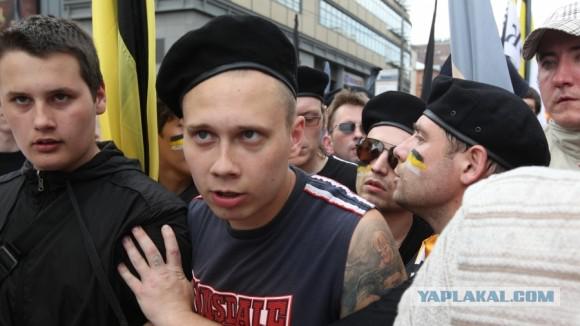
Source:
As early as the next parliamentary elections in Russia will nationalist parties, who will be able to dial up to 10% of the vote. This conclusion makes the working group of the Public Chamber (OP) for the analysis and resolution of international conflicts in a study commissioned by the close to the "United Russia" the Institute for Public Planning (INOP). The final results will be presented in the report "The National Question in public and political life", which is manifest in the end of May. But some of the theses became known now - they announced the head of the working group of Mikhail Romanov.
7 photo

Short abstracts are as follows:
- While the nationalist parties in Russia are not strong enough, however, in 2016 when the parliamentary elections will be held, the situation will change.
- After four years without any problems, they will be a barrier to 5%, and in the best party with patriotic rhetoric will be able to dial up to 10% of the vote.
These findings indirectly confirms the analysis and "Levada Center." In November 2012, the center conducted a survey of analysts in the capital and made a rating of parties. Nonexistent party "nationalist" was in second place after the "United Russia", ahead of the Communists, the Liberal Democratic Party and "Yabloko».
It is appropriate to recall the history of the success of the Ukrainian nationalist party "Svoboda". In the parliamentary elections in November 2012, attended by 87 parties, "Freedom" was among the five parties that entered the Parliament - and, with the result is 10%. It is symptomatic that the party enjoys support even in the Donetsk region, whose population is traditionally negative attitude to the ideology of Ukrainian nationalism. Cells "Freedom" are available in regional centers and small towns - despite the fact that the financial resources of the Party, the competition is quite modest.

Will succeed Russian nationalists?
- The proportion of people in Russia, supporting the nationalist ideology - 10% of voters - unchanged for 12 years now, and it does not grow, - says the leader of the "new power", Professor Valery Solovey. - There are two important factors that determine the behavior of the electorate. First, we must realize that no party in Russia, which calls itself a nationalist, the Kremlin will not be registered. Secondly - we already have a registered party that this electorate can claim: the Liberal Democratic Party and the party "Rodina". So the next Duma elections - as it was before - the nationalist electorate rastaschat by different parties. In Russia, unfortunately, there is no political force that would be able to consolidate it and lead.
- What if OP picks your research?
- It is an element of fear trade. Like, here, look - the nationalists will go to the parliament. What the Liberal Democratic Party in the Parliament we have not presented ?! I have these fears are ridiculous ...
- Why is not growing number of supporters of nationalism? - People here are afraid of open association with nationalism. The paradox is that while the vast majority of our population supports the position of banal nationalism. They understand the importance of ethnicity, two-thirds of people experiencing xenophobic feelings towards certain ethnic groups. In other words, the breeding ground for nationalism in Russia there.
In my opinion, the problem of Russian nationalists is that there were a party that implements a nationalist agenda, but it does not call himself a nationalist.

- Is there a chance that "masked" party with a nationalist agenda will be by 2016?
- From a purely nationalist agenda to sense a little, the agenda should be broad - social and political, nationalist elements should only be included in the package. With regard to timing - the present Duma fails to finalize until 2016, it is now becoming apparent. I think the disposition of political forces in the event of early re-election of the Parliament will be unpredictable. It is to this development the Kremlin is preparing today.
- Chaos of early elections to the Duma gives you a chance to strengthen the position of the nationalists?
- Not sure. Early elections are an attempt to get out of a serious national crisis, but they only exacerbate the crisis. And what will happen in the chaos, it is impossible to predict. It is impossible to say who is in this situation will prevail.

- Russian nationalism can develop on the Ukrainian scenario?
- No, we have with Ukraine, the political situation is completely different. Ukraine was formed as a nation state. The Russian authorities are trying to revive our country's territory, chimerical Eurasian empire in which there is no place to nationalism. From the point of view of the Kremlin, Russia - not the nation-state. Such power will prevent anything that is connected not only with nationalism, but also with the realization of national interests.
The chances for the nationalists in Russia is - and, in my opinion, very good. But again, only if they stop calling themselves nationalists and change agenda ...
"National Party - I would not call them nationalist - have a very good electoral chances," - said a member of the Coordinating Council and opposition from nationalists Konstantin Krylov.
- In view of the specific situation in the country, the national question today is very acute in Russia, - says Krylov. - Moreover, the government itself tried to strengthen the sector nationalists. So the emergence of national parties is possible. Just to say: we are talking about political parties, which can not cause fear and terror in the man in the street. It will be legal parties, which will deal exclusively with the political struggle for the rights of Russian.

- Is the Kremlin is interested in the appearance of these parties?
- The Kremlin is, maybe people are bad, but think they are quite clear. They understand that the policy which they are - and the other, for various reasons, they can not spend - nationalists are simply doomed to success. Excuse me, but what the Kremlin expected once created, for example, the institution of privileged people - Caucasian - in Russia? Or after multiplied the number of migrants ?! Not surprisingly, the public mood appeared National Bank.
The Kremlin is now thinking, what if the situation will not be possible to reverse the (repressive plan "A" also worked out). Then the government will have to begin to plan "B" and analyze the processes that the Kremlin considered harmful. Publication of the study of the Public Chamber in May will be a signal, an invitation to the elite discussion to plan "B". This plan involves, in my view, that the nationalists will be able to take a large number of votes in the election, and the Kremlin is forced to think in advance about the legal forms of use nationalist ideas. One of moves - use the national rhetoric as part of pro-Kremlin parties. But there are other moves that the elite will discuss ...
"The Nationalists will fall to Parliament only if the Kremlin will weaken," - said vice-president of the Center for Political Technologies, Alexei Makarkin.
- I believe that the Duma early elections will not be because the Public Chamber in his study and talks about the year 2016 - said Makarkin. - To dissolve the parliament, the President must either dismiss the government, that this Parliament will make a vote of no confidence, or should be a situation in which the Duma rejects three times the three candidates proposed by the President at the premiere. All this is now unlikely scenario.
As for the participation in the upcoming Duma elections nationalists think OP realistic about their potential. In these evaluations, experts largely repelled from the analysis of the party "Rodina". Let me remind you, in 2003, a moderate nationalist "Motherland" Dmitry Rogozin and Sergei Glazyev received 9% of the vote and passed in the State Duma.

Today, a request for a party that would have expressed the national idea, combined with the idea of social justice, did not disappear. "Homeland" of the 2003, by the way, this was. For example, she preached the idea of weaning revenues from the oligarchs and transfer them to the people through the distribution of natural resource rents.
But do not forget that the project "Homeland" was created in the Kremlin. Power itself has put his helm specific politicians - who otherwise might not get up - and provided the party "green light", including in the media. Only this nationalists gained the elections-2003 good result.
Today the situation is completely different. First of all, the nationalists split because of internal disagreements and conflicts. Conflicts like these are ideological in nature - for example, discusses the degree of radicalism organizations, or attitude towards the Orthodox Church - and leadership. It is hard to imagine, for example, that "the Russian National Union," Sergei Baburin find a common language with one of the leaders of the nationalist movement "Russian" Dmitry Demushkina.
Yes, and the Kremlin's position in relation to the nationalists twofold. On the one hand, there is a formal admission into the political space nationalist parties among the preexisting. However, these projects too much, they are too few and scattered to become successful alone.
In principle, the Kremlin can, if necessary, to take some of those projects under its aegis, and to provide them with the necessary resources. This will allow him to gain a significant nationalist faction in the parliament, which will be required to support the current government. On the other hand, before the eyes of the Kremlin have experience the same "homeland" - perhaps the party was in the State Duma, then in a very short time has become play their own game. How it ended, all well know - "Motherland" collapsed, and its elements are included in a totally different project called "Fair Russia". Again forming a nationalist movement that later would be uncontrollable, the Kremlin does not want to.
And among the nationalists themselves are divided as to the true power. National Democrats are in opposition to the Kremlin, while the "Russian People's Union" is cooperating with the government. Even among retired military, which traditionally configured nationalist, for one sample - a retired GRU colonel Vladimir Kvachkov, who was sentenced by the court to 13 years in prison for attempting to organizing an armed rebellion, but for others - Colonel-General Leonid Ivashov, who believes that the current government is better than the opposition.
In short, the request to have a nationalist party, there are potential voters ready to vote for it. But internal conflicts within the ranks of the nationalists are unlikely to allow them to form a full-fledged political force. Only if in the near future the Kremlin will weaken enormously, nationalists will have a real chance to get into parliament ...
Posted in [mergetime] 1364634331 [/ mergetime]
ALL IN THE FIGHT !!!

Source:
